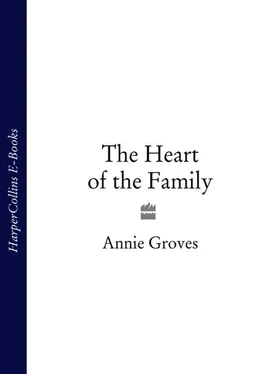ANNIE GROVES
The Heart of the Family
This novel is a work of fiction. The names, characters and incidents portrayed in it are the work of the author’s imagination. Any resemblance to actual persons, living or dead, events or localities is entirely coincidental.
HarperCollins Publishers Ltd. 1 London Bridge Street London SE1 9GF
www.harpercollins.co.uk
First published in Great Britain by HarperCollins Publishers 2009
Copyright © Annie Groves 2009
Annie Groves asserts the moral right to be identified as the author of this work
A catalogue record for this book is available from the British Library
All rights reserved under International and Pan-American Copyright Conventions. By payment of the required fees, you have been granted the nonexclusive, nontransferable right to access and read the text of this ebook onscreen. No part of this text may be reproduced, transmitted, downloaded, decompiled, reverse engineered, or stored in or introduced into any information storage and retrieval system, in any form or by any means, whether electronic or mechanical, now known or hereinafter invented, without the express written permission of HarperCollins ebooks
HarperCollins Publishers has made every reasonable effort to ensure that any picture content and written content in this ebook has been included or removed in accordance with the contractual and technological constraints in operation at the time of publication
Source ISBN: 9780007265909
Ebook Edition © OCTOBER 2012 ISBN: 9780007322695
Version: 2016-12-15
For my readers who have so kindly and generously supported me. I hope you are all enjoying reading about the Campion family as much as I am enjoying telling their story .
Cover
Title Page
Copyright
Dedication
PART ONE
ONE
TWO
THREE
FOUR
FIVE
SIX
SEVEN
EIGHT
NINE
TEN
ELEVEN
TWELVE
THIRTEEN
FOURTEEN
FIFTEEN
SIXTEEN
PART TWO
SEVENTEEN
EIGHTEEN
NINETEEN
TWENTY
TWENTY-ONE
TWENTY-TWO
TWENTY-THREE
TWENTY-FOUR
TWENTY-FIVE
TWENTY-SIX
TWENTY-SEVEN
TWENTY-EIGHT
TWENTY-NINE
THIRTY
Keep Reading
Acknowledgements
About the Author
Also by the Author
About the Publisher
PART ONE
Wednesday 7 May 1941
It had just gone midnight. Conversation between the occupants of Jean Campion’s comfortable and homely kitchen slowed and stuttered, then died.
Jean’s twin daughters, Sasha and Lou, Katie, her billetee and her son, Luke’s, girlfriend, looked at one another.
Jean’s husband, Sam, who had been out working since eight o’clock that morning helping to remove what could be cleared of the devastation left by Hitler’s six nights of ferocious bombing, slumped in his chair, looking defeated. All of them were waiting for the dreaded and now familiar sound of the air-raid siren, warning them that Luftwaffe bombers were approaching the city, bringing yet another night’s destruction and death.
The tension caused by the heavy bombing of Liverpool had taken hold of them just as it had all those who were now virtually trapped in a city cut off from the rest of the country, its buildings destroyed, its people killed and maimed, a helpless victim now waiting for the deathblow.
Jean looked at the twins. They had been very subdued since Sasha had been rescued on Saturday night after becoming trapped in a bomb site. The young UXB soldier who had taken Sasha’s place beneath the bomb so that she could be rescued without the device being disturbed had become a hero to the whole family.
Without his bravery Jean was convinced that there would have been only one of the twins here now. Her heart missed a beat. She mustn’t think of what could have been. She must concentrate instead on praying that they would all survive what was happening now. The twins were growing up. Soon they would be sixteen – young women and not merely girls any more. Sixteen and on the brink of womanhood with their adult lives stretching ahead of them, if they survived Hitler’s onslaught on Liverpool.
Just gone midnight. If the bombers were coming then they would know soon. The siren had sounded around midnight for the last three nights.
Jean thought of her two eldest children – Luke in the army and stationed at nearby Seacombe barracks; her daughter Grace in her final year as a trainee nurse and on duty tonight in one of the city’s busiest and most vulnerable hospitals – and she prayed as she had done every night since the war had started that those she loved would all be safe.
Surreptitiously Katie looked at her watch. Nearly half-past midnight. Would tonight be yet another spent in the air-raid shelter, trying not to be afraid for Luke, whom she loved so much and whom she knew, as a serving soldier whose unit was on home defence duties, would be in far more danger than they were?
Jean couldn’t bear the tension any more. ‘I’ll put the kettle on—’ she started to say, and then stopped as it began: the shrill urgent call to protect themselves, the sound of which gripped a person by the throat and around the heart, a shuddering shocking exhalation of noise that warned of the terrible unbelievable horror that brought death raining down from the night sky.
They exchanged helpless, anguished looks.
‘Here we go again,’ Sam announced unnecessarily. ‘I’ll walk you down to the shelter and then I’d better go and report for fire-watching duty.’
‘But, Sam, you’ve worked from morning to night for the last six nights,’ Jean protested, as they all picked up the bundles containing the sleeping bags and everything else they would need for yet another night in the air-raid shelter.
‘Aye, well, at least I can still work, not like some,’ Sam replied grimly.
Jean felt her heart bump shakily. On Sunday morning, in the aftermath of Saturday night’s heavy bombing, two of his colleagues had been badly injured when a building had collapsed on top of them.
Fortunately, the shelter was only at the end of the road. Ash Grove nestled comfortably between the top end of Edge Hill, with its aspirational working-class inhabitants, and the bottom end of middle-class Wavertree, lying further inland to the east, and was far enough away from the docks and the city centre not to attract the main attention of the Luftwaffe. But not so far that the Campion family couldn’t in happier times walk down to the ferry in under half an hour when they wanted to visit Jean’s sister, Vi, and her family who lived across the water in Wallasey. And certainly close enough for Luke to take that same ferry home from the Seacombe barracks, which also lay on the other side of the river from the city.
Once they were outside in the street they were able to see what the blacked-out windows had protected them from.
Below the gentle rise that lifted Edge Hill and Wavertree above the city proper, the probing beams of the anti-aircraft batteries revealed ghoulish images of gutted buildings, still smoking from the fires of earlier bombing raids.
They had reached the shelter now. Sam gave Jean a swift hug and, unusually for such an undemonstrative man, turned to hug both the twins, then placed his hand on Katie’s arm and gave it a small squeeze before standing to one side to watch as they all filed into the shelter.
Jean prayed, as she always did, that her husband would return from his work safe and unharmed.
‘Not again.’
Grace heard the note of suppressed panic in the voice of the probationer who was new on the ward, and told her calmly, as though she hadn’t spoken, ‘I think Mr Williams has finished with his bottle now. Go and collect it from him and take it to the sluice room, will you? When you’ve done that come back and help me get the patients ready to take down to the shelter.’
Читать дальше












